Lifestyle change program engagement in real-world clinical practice: a mixed-methods analysis
- PMID: 36694916
- PMCID: PMC10068905
- DOI: 10.1093/tbm/ibac098
Lifestyle change program engagement in real-world clinical practice: a mixed-methods analysis
Abstract
Participant engagement in structured lifestyle change programs (LCPs) is essential for adopting behaviors that promote weight loss; however, the challenges to, and facilitators that promote, engagement with such programs are not well understood. We conducted a mixed-methods study among real-world LCP participants to assess factors associated with program engagement and to examine the reasons for withdrawal. Using electronic health records (EHR), we identified LCP eligible participants between 2010 and 2017. Multivariable logistic regression was used to assess associations between program engagement and baseline characteristics. Semi-structured interviews with LCP participants were conducted and thematically analyzed to examine reasons for withdrawal. A total of 1,813 LCP participants were included. The median number of sessions attended was 10 of 21-25 sessions. Highest LCP engagement was associated with factors potentially related to self-efficacy/motivation, such as older age, higher baseline weight, prior healthcare utilization and an absence of a history of smoking or depression. Engagement was also negatively associated with being Non-Hispanic Black versus White. The qualitative analysis of the interviews revealed four general themes pertaining to participants' withdrawal: competing priorities, perceived program effectiveness, characteristics of the program, and facilitator-related factors. Taken together, results from this mixed-methods study suggest that motivation and self-efficacy are important for program engagement; future LCP enhancements should incorporate flexible formats that may help participants manage competing priorities and maximize personal and cultural relevance for all racial/ethnic groups, especially those who have not benefitted fully. Furthermore, participants should be encouraged to set realistic goals to manage expectations.
Keywords: Diabetes prevention program; Lifestyle change; Mixed-method; Program engagement; Program withdrawal.
Plain language summary
Engaging in a structured lifestyle change program (LCP) is essential to learn healthy behaviors, however, it is not well understood. This study examined factors associated with program engagement and reasons for program withdrawal at a large healthcare system. Highest LCP engagement was found to be associated to factors potentially related to self-efficacy/motivation including older age, higher initial weight, and prior healthcare utilization. Non-Hispanic Black, history of smoking, and prior diagnosis of depression were found to be negatively associated with LCP engagement. Program withdrawal was related to four themes: competing priorities, perceived program effectiveness, characteristics of the program, and facilitator-related factors. These findings suggest that motivation and self-efficacy are important for behavior change program engagement.
© Society of Behavioral Medicine 2023. All rights reserved. For permissions, please e-mail: journals.permissions@oup.com.
Figures
Similar articles
-
Engaging rural women in healthy lifestyle programs: insights from a randomized controlled trial.Trials. 2015 Sep 16;16:413. doi: 10.1186/s13063-015-0860-5. Trials. 2015. PMID: 26377190 Free PMC article. Clinical Trial.
-
Motivation and Problem Solving Versus Mobile 360° Videos to Promote Enrollment in the National Diabetes Prevention Program's Lifestyle Change Program Among People With Prediabetes: Protocol for a Randomized Trial.JMIR Res Protoc. 2021 Jun 14;10(6):e28884. doi: 10.2196/28884. JMIR Res Protoc. 2021. PMID: 34125075 Free PMC article.
-
Reach, engagement and effectiveness of in-person and online lifestyle change programs to prevent diabetes.BMC Public Health. 2021 Jul 5;21(1):1314. doi: 10.1186/s12889-021-11378-4. BMC Public Health. 2021. PMID: 34225674 Free PMC article.
-
Changes in Healthcare Utilization After Lifestyle Intervention for Weight Loss.Am J Prev Med. 2024 Apr;66(4):619-626. doi: 10.1016/j.amepre.2023.10.018. Epub 2023 Oct 29. Am J Prev Med. 2024. PMID: 37907133 Free PMC article.
-
A multiple sclerosis lifestyle behavior online course: Qualitative analysis of participants' motivations, expectations and experiences.Front Public Health. 2022 Dec 7;10:1022185. doi: 10.3389/fpubh.2022.1022185. eCollection 2022. Front Public Health. 2022. PMID: 36568793 Free PMC article. Clinical Trial.
Cited by
-
Integration of a lifestyle modification intervention for women with overweight and obesity in a gynecologic oncology practice.Gynecol Oncol. 2025 May;196:168-174. doi: 10.1016/j.ygyno.2025.04.516. Epub 2025 Apr 12. Gynecol Oncol. 2025. PMID: 40222070 Free PMC article.
-
Examining paradoxical session attendance and weight loss relationships in a clinic based lifestyle modification intervention.Obes Sci Pract. 2023 Jul 13;9(6):641-652. doi: 10.1002/osp4.696. eCollection 2023 Dec. Obes Sci Pract. 2023. PMID: 38090689 Free PMC article.
-
Dietary Polyphenols as Potential Therapeutic Agents in Type 2 Diabetes Management: Advances and Opportunities.Adv Nutr. 2025 Jan;16(1):100346. doi: 10.1016/j.advnut.2024.100346. Epub 2024 Nov 19. Adv Nutr. 2025. PMID: 39566886 Free PMC article. Review.
References
-
- Centers for Disease Control and Prevention. 2021. National Diabetes Prevention Program: Working Together to Prevent Type 2 Diabetes. Centers for Disease Control and Prevention. https://www.cdc.gov/diabetes/prevention/index.html. Accessibility verifi...
-
- National Institute of Diabetes and Digestive and Kidney Diseases. 2021. Diabetes Prevention Program (DPP). U.S. Department of Health and Human Services. https://www.niddk.nih.gov/about-niddk/research-areas/diabetes/diabetes-p.... Accessibility verified October 20, 2021.
Publication types
MeSH terms
Grants and funding
LinkOut - more resources
Full Text Sources




